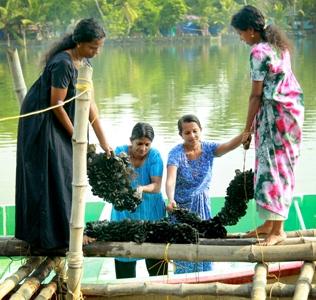After a major setback in the last year’s flood, farmers in Moothakunnam in Ernakulam district have had a bumper harvest of mussels under the guidance of Central Marine Fisheries Research Institute (CMFRI).
Five self-help groups in the region reaped a total yield of 6.5 tonnes of mussels in as many as five farming units. The farmers—most of them are women—started the farming in January using a structure made of bamboo with a size of five metre each width and length.
The farmers, who turned into bivalve farming as an additional livelihood option, had suffered a severe loss owing to last year’s devastating flood. Their oyster farming units were completely destroyed due to the calamity.
They were also worried that post-flood changes in the aquatic ecosystem may affect the mussel farming. But, farmers are now relieved with a good harvest this time and are hopeful of compensating the loss last time.
The farming that lasted 5 months was carried out under the guidance of the Molluscan Fisheries Division of the CMFRI. After the harvest, the produce was undergone depuration, a scientific process of expelling contaminants from gills and guts of mussels by providing them with good purified seawater before they are used for consumption which was also developed by the CMFRI.
As there is no need for feeding, the bivalve farming is less expensive compared to fish farming. However, the initial capital to set up the farming units is the major expense of the farming.
Available in CMFRI
Depurated mussel meat from the farms are available for sale in the CMFRI. It can be had from the Agriculture Technology Information Centre (ATIC) from 10 am to 4 pm on all working days till the stock ends. (Price: Rs.175 for a 250-g packet.) Mussels are rich in protein, lipids, carbohydrates, minerals (calcium, iron, copper, zinc, phosphorus) and vitamins.
Photo caption: Women farmers engaging in the harvest of mussel in Moothakunnam, Ernakulam.




















